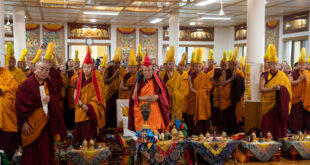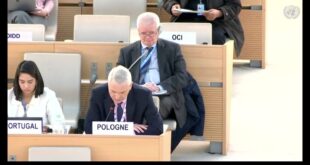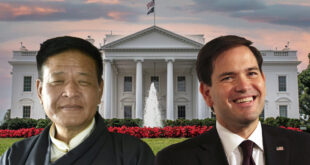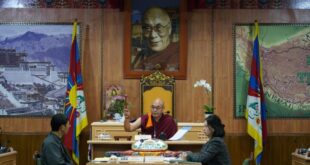On May 7, 2011, His Holiness the Dalai Lama had three main programs. In the morning he met with the press after which he addressed the Tibetan community. In the afternoon, he participated in a panel discussion on the state of Tibetan Buddhism, which was attended by several Chinese students and scholars.
His Holiness the Dalai Lama began his program in Minneapolis by meeting the press for a littler over half an hour in the morning. He began by talking about his life’s commitments of promotion of human values, religious harmony and resolving the issue of Tibet. He said human beings were biologically equipped to have human affection through cultivating inner strength and self-confidence. Secondly, on the issue of religious harmony, His Holiness said given the nature of different human dispositions there was the need of a variety of religions. However, there was the potential of these coming together on account of the commonality of their purposes. His Holiness added that these two were his life long commitments.
On the issue of the just Tibetan struggle, His Holiness said he had mentioned that in March this year he had made clear his decision of discontinuing the nearly 400 year tradition of the Dalai Lama institution shouldering political authority. His Holiness explained that he saw it a bit hypocritical for him to continue the dual responsibility over spiritual and temporal authority when he was advising others to separate religion from politics. He said the Tibetan refugee community had matured in democratic process and the time was ripe to hand over the political responsibility to the elected Tibetan leadership.
His Holiness suggested that the media had a role in promoting public awareness about the issues of human values and religious harmony and repeated his view that the media needed to be like an elephant using its long nose to do all round investigations.
His Holiness then answered questions from reporters.
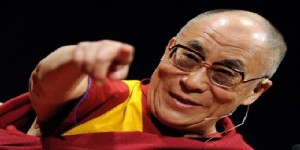
The first question related to His Holiness’ outreach to other religious traditions and inquired about his interaction with the Jewish community and the lessons from this interaction. His Holiness said that the Jewish people had been able to preserve their identity and culture for centuries and some times even in hostile circumstances. He said his interaction with the Jewish community revealed that the Jewish tradition depended on the family rather than on institution whereas in the Tibetan case there was much dependence on the institution.
A question by an 11-year-old student who had been given a news assignment by his school seeking His Holiness’ advice to the younger generation received a very detailed response. His Holiness talked about the boy being part of the 21st century while he was from the 20th century. He said the 20th century was one of bloodshed and that there was the need to make the 21st century one without bloodshed. His Holiness said that there would still be problems but people need to find realistic ways to resolve them through dialogue and reconciliation. He suggested the cultivation of inner disarmament and eventually leading to external disarmament. His Holiness said this could be achieved first by abolition of nuclear weapons and subsequently by a demilitarized world.
Then referring the age of the boy, His Holiness said admired his tenacity saying when he was at that age he had not been paying real interest in studying. He said he regretted this.
Another reporter asked His Holiness his thoughts on terrorism in this world after the killing of Bin Laden.
His Holiness responded by saying he considered himself as a messenger of the Indian tradition of Ahimsa. Therefore, he said he always stressed the importance of non-violence adding that dialogue is the only way. His Holiness explained his thinking by saying that when violence is used, even though you may have a justified goal, and the motivation may be good, but since the very method is violence it can have unexpected consequences. He said that this was because the very nature of violence is that it can easily become out of control. Therefore, at a practical level, violence is a wrong method and morally wrong, too, he said.
His Holiness said terrorism is the worst kind of violence. He added that the September 11 tragedy is very sad with over three thousand people having been instantly killed.
His Holiness said on September 12, 2001, just a day after the tragedy, he had written a letter to President George W Bush expressing his condolences and sorrow. He said in the letter he also hoped that the counter measure would be through nonviolent way. His Holiness said that quite often thereafter he had opined that if the problem was mishandled then from there being just one Bin Laden then after 5-10 years there might be 10 Bin Ladens, and then 100 Bin Ladens. He said that this would be because once human hatred and resentment are developed it will become very difficult.
His Holiness said that he heard there were some celebrations in America after the killing of Bin Laden. He said while it is understandable he recalled responding to this question some days back saying that in a way, the trouble maker, your enemy, is your best teacher. Therefore, instead of being joyful you should pray.
In any case, His Holiness said that regarding death sentence, even when he was young around 1945-46, just after the Second World War, when during the Nuremberg Trials some German leaders were hanged, he felt terrible. They may have committed wrong thing, but he said from a certain view point it would have been better to let them live so that they may be able to realize their past faults. He said there is also the possibility that today’s merciless person could change into a merciful person through affection. He added that he supported the effort at abolishing death sentence and that he was a signatory of Amnesty International’s campaign on it.
When Saddam Hussein was given the death sentence he said he had expressed his sorrow. He was not only a defeated person but was already a prisoner, His Holiness said adding that from the photo he saw Saddam had become old and demoralized person. He said in Bin Laden’s case also he was already more or less defeated.
His Holiness then stressed on the need for a wider perspective on death sentence as the consequences may be wider, too.
His Holiness also spoke about responsibilities of students about to graduate from college saying they need to be self-confident, adhere to moral principles and be optimistic. He also addressed the issue of death from a religious believer’s perspective.
Address to the Local Tibetan Community
Following this meeting with the press, His Holiness went to the University of St. Thomas in St. Paul, the venue of the audience for the Tibetan community. Over 2000 Tibetans from Minnesota as well as neighboring states had gathered. His Holiness was welcomed with traditional Tibetan dances as he entered the arena.
Following the singing of the Tibetan national anthem, Tibetan community President, Tsewang Ngodup, presented a copy of the detailed report of his association to His Holiness the Dalai Lama and read an abridged version to the public. He informed His Holiness about the activities that the Tibetan American Foundation of Minnesota was involved in partnership with the University of Minnesota, the Tibetan Medical & Astro Institute, Tibetan Institute of Performing Arts, and TigerLion Arts.
Thereafter, members of the Tibetan community presented two cultural performances, including one especially composed in honor of His Holiness the Dalai Lama.
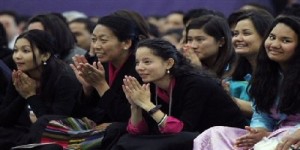
In his address, His Holiness reminded the Tibetans gathered there that the objective of Tibetans being in exile was to do something on the Tibetan issue. He asked them to have pride in their identity and commended the fact that as the Tibetan community is going through a generational shift the sense of identity continued to be strong.
He said Tibetans in Tibet are not able to express their true feelings and those Tibetans in exile who have the opportunity to do so should work to represent them. He also said Tibetans in Tibet were risking their lives for the sake of Tibetan religion and culture and so those in exile ought to be more responsible in their preservation and promotion. He said it was not sufficient to be able to read and write Tibetan and that there was the need to have a deeper understanding of our heritage. His Holiness said the Kagyur and the Tengyur Buddhist scriptures should not merely be placed on the altar but need to be studied as textbooks.
His Holiness talked about the importance of the Tibetan Administration in exile and appreciated the fact that the Tibetans in Minnesota had actively participated in the recent Tibetan election process. His Holiness explained the development and the process leading to his decision to devolve his political authority to the elected Tibetan leadership.
His Holiness informed the audience that he had just had his annual medical checkup at the Mayo Clinic in Rochester and that the doctors have said his health condition was good. To the applause of those gathered His Holiness in fact said that doctors said they found him in better health condition then during the last check up.
His Holiness also talked about his reason for his Middle Way Approach, which he said was being supported by the international community. He also said that China would have to change.
Panel Discussion on State of Buddhism Today
Following the Tibetan audience, His Holiness came back to the hotel to participate in a panel discussion on the “State of Buddhism Today.” Panelists included Dr. Ann Waltner from the University of Minnesota who spoke on Buddhism in Late Imperial China; Writer Li Jianglin who spoke about “Revival of Buddhism in China and its implication”; Zhen Wang, a PhD candidate who spoke on “The State of Buddhism in China today: A personal perspective”; Dr. Roger Jackson of Carleton College, who spoke on “Globalization and the Future of Buddhism;” Dr. Mark Umbreit of the University of Minnesota, who spoke on “Forgiveness, Peacemaking, and Reconciliation: a Buddhist Perspective;” and Dr. Christine Marran from the University of Minnesota, who addressed the issue of “Buddhism and Environmentalism.”
A majority of the nearly two hundred attendees at the panel discussion were Chinese students and scholars.
Among the issues raised were about the increasing interest in Tibetan Buddhism in China, the active interest in Buddhism among the younger generation, the personal perception of a panelist that Tibetan Buddhist temples seemed to have “soul” compared the feeling of “soulless” in Chinese Buddhist temples, personal feeling of another panelist that Buddhist teaching had changed his life and work. As for the future of Buddhism there were issues raised about teacher-student relationship and the decline of monasticism that needed to be addressed.
In his address, His Holiness began by talking about the historical development relating to human values. He said from dependence on religion to provide solution to all problems, people turned to scientific and technological development for solution. He then talked about the change in perception from science and spiritualism being different to one where scientists were actively paying interest in Buddhist science. He said scientists find the Buddhist theory of interdependence very similar to quantum physics. He felt that interest in Buddhist science would continue to grow among scientists. His Holiness felt that the Buddha’s message of thoroughly investigating everything, even his teachings, before accepting them would continue to be relevant in all societies, including in China.
During the Question & Answer session, His Holiness was asked what he had learned in terms of political leadership from meeting politicians like the French and American presidents. His Holiness responded saying that he was a simple Buddhist monk who did not have any political training. But what he learned was the importance of being truthful, honest and transparent saying too much hypocrisy destroys people’s trust.
His Holiness talked about his discussions, in the early 1970s, with British writer Felix Green, a friend of Chinese leader Zhou Enlai, who subscribed to the official Chinese viewpoint on Tibet but after prolonged discussion, he finally changed his attitude after realizing that he was fed one-sided information.
His Holiness referred to himself as a Marxist but not a Leninist and said that there were many Buddhists in India and Sri Lanka who were Marxists, too.
His Holiness said Mao Zedong was really a revolutionary in his early years but that during the 1950s that purity had gone away. He also said there were quite many Tibetans who had joined the Communist Party in the 1930s full of enthusiasm but that in the mid 1950s the enthusiasm waned when faced with China’s reality.
To another question about how would His Holiness look at the news of violence and riots in Tibet in 2008, His Holiness recalled being told by a staff in the afternoon of March 10, 2008 about a demonstration in Lhasa. He said in the next few days there were demonstrations but the Chinese Government talks only about March 14 when violence ensued. His Holiness also talked about reports saying that said that many of the participants on that day seem to be new people not known to the locals. He said therefore there was the need for a thorough and unbiased investigation.
To another question, His Holiness talked about the development of his contacts with the Chinese leadership in Beijing from 1978 to the period of re-establishment of contact in 2002 and the nine rounds of talks to date. He said that from past experience much depended on individual Chinese leaders saying Chinese leader Hu Yaobang had been very open and that the Tibetan issue would have been resolved had he still lived.
His Holiness then said he generally divided the modern Chinese period into four eras: Mao Zedong era during which time ideology was given importance; Deng Xiaoping era during which time making money was given importance; Jiang Zemin era during which time the Party changed from representing the working class to including the Middle class and others; and Hu Jintao era when a harmonious society is the slogan.
His Holiness said the developments during these four eras indicate that even though it is the same Communist Party, new thinking developed according to the new reality. He said that the Communist Party had the ability to do this. His Holiness talked about the new leadership in China that was coming about next year saying he knew very well the father of Xi Jinping.
All the questions were from Chinese attendees. In conclusion His Holiness appreciated that quite many Chinese students and scholars had come to attend this discussion. He urged them to study hard not to forget their motherland.
On May 8, 2011 morning, His Holiness will lead a Medicine Buddha Empowerment and give a public address in the afternoon on “Peace Through Inner Peace.”

